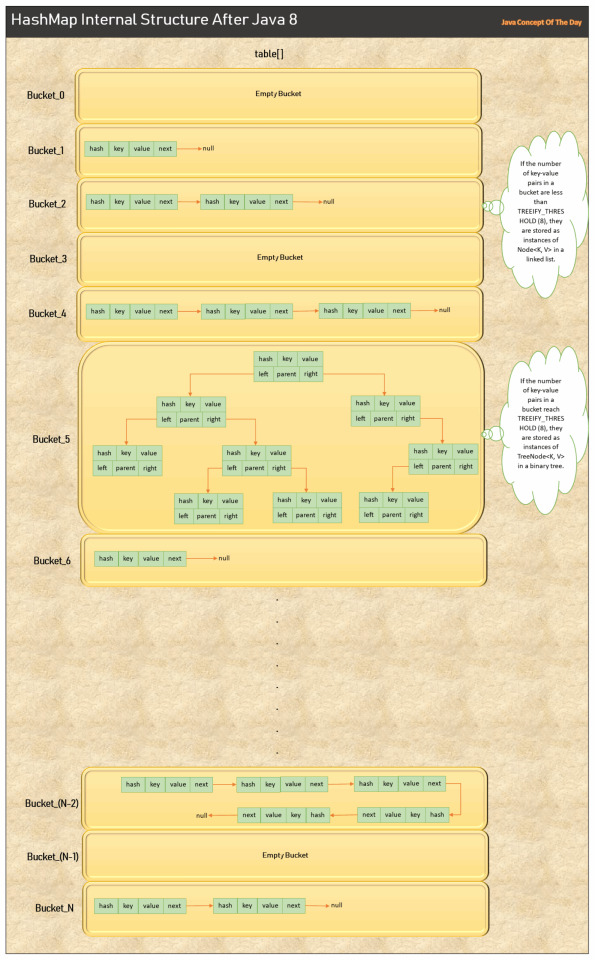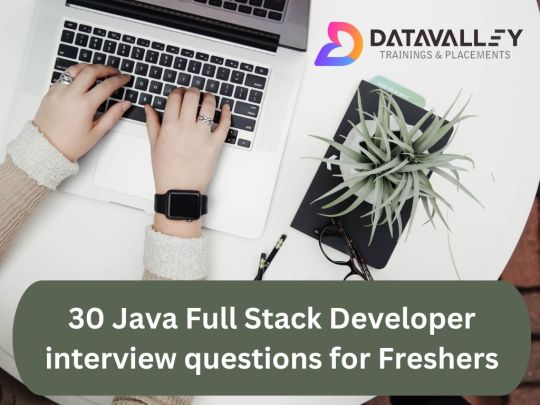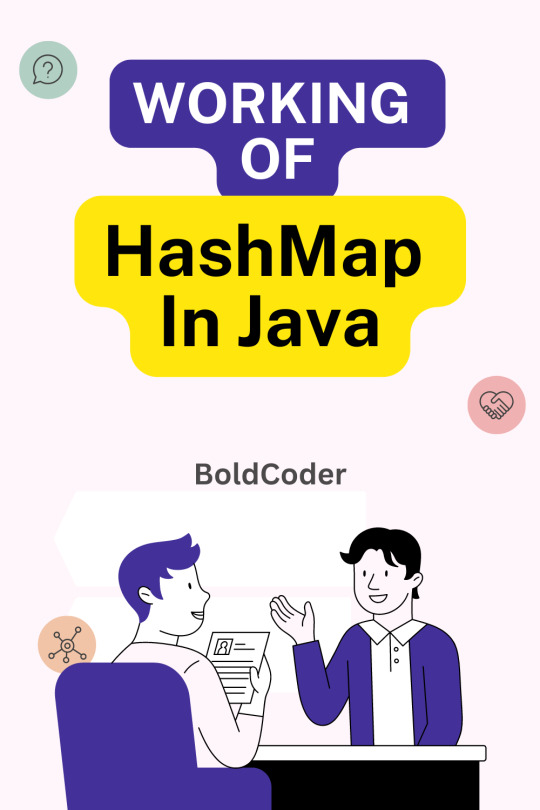#Java interview questions
Explore tagged Tumblr posts
Text
HashMap Related Interview Questions And Answers
These are the some best of HashMap related interview questions and answers for both freshers and experienced Java professionals. I hope they will be helpful for your technical interview. Java HashMap Interview Questions And Answers : 1) What is HashMap in Java? HashMap is a class in Java which implements Map interface. It is a data structure which holds the data as key-value pairs for…

View On WordPress
0 notes
Text
0 notes
Text
Collections In Java Interview Questions and Answers
Prepare for your next Java interview with our comprehensive guide on Collections in Java⚡️. This post covers essential interview questions and detailed answers about Java's collection framework. From lists and sets to maps and queues, we explore the core concepts, usage, and differences between various collection types. Each question is accompanied by practical examples and explanations to help you grasp key concepts and perform confidently in interviews. Ideal for Java developers looking to sharpen their skills and ace their interviews.⬇️🔥🔥
➡️CLICK HERE TO VIEW

0 notes
Text
Top 30 Java Interview Questions

Discover the top fundamental 30 Java questions for the interview, which cover every important topic like multithreading, exception handling, etc. Enroll at CodeSquadz and learn how you can ace the Java developer interview.
0 notes
Text
Mastering Advanced Java Interview Questions: The Complete Guide
Introduction To enhance your career in Java programming, you must grasp **advanced Java interview questions**. In this thorough tutorial, we'll dig into the complicated realm of advanced Java ideas, which may help you stand out in interviews and develop your career.
Understanding the fundamentals 1. Object-Orientated Programming (OOP) Advanced Java requires a deep understanding of Object-Oriented Programming (OOP) ideas. Interviewers frequently test your comprehension of concepts like as encapsulation, inheritance, polymorphism, and abstraction. Provide real-world examples that demonstrate your ability to apply these ideas.
2. Exception Handling Exception handling is an important part of building resilient Java programs. Dive into the complexities of attempt, catch, throw, and finally.Discuss your experiences with checked and unchecked exceptions, and demonstrate how you've achieved graceful error handling in your applications.
Advanced Java Topics. 3. Multithreading and concurrency. Multithreading and concurrency are areas where experienced Java developers excel. Explain the relevance of multithreading, talk about thread life cycles, and demonstrate your thread synchronization skills. Describe situations where you've improved performance using efficient concurrency methods.
4. Internals of the Java Virtual Machine (JVM Interviewers frequently test your understanding of Java Virtual Machine (JVM) internals. Go beyond the fundamentals and investigate memory management, trash collection, and class loading techniques. Share your experience improving code for improved JVM performance.
5: Design Patterns Showcase your grasp of design patterns like Singleton, Observer, and Factory. Offer insights regarding how you've Implemented these practices to improve code maintainability and scalability. Interviewers value applicants who can translate academic knowledge into practical applications.
Database connectivity. 6: Java Database Connectivity (JDBC) Java Database Connectivity (JDBC) is the foundation of Java's interface with databases. Discuss your ability to make database connections, execute queries, and handle transactions. Showcase how you improved database processes in your projects.
7. Hibernate Framework. Explore the world of Hibernate, an object-relational mapping (ORM) framework. Share your experiences mapping Java objects to database tables, and explain how Hibernate simplifies complicated database interactions. Highlight the benefits of utilizing Hibernate with Java applications.
Advanced Data Structures & Algorithms 8. Collection Framework Collections Framework is a critical component of Java programming. demonstrate your understanding of many collection interfaces and classes. Discuss examples in which using the proper data structure resulted in improved code performance.
9: Algorithm Optimization Interviewers frequently offer issues pertaining to algorithm optimization. Demonstrate your problem-solving abilities by describing how you've improved algorithms for reduced time and space complexity. Discuss the effects of your improvements on overall system performance.
Conclusion: Mastering advanced Java interview questions is more than just academic knowledge; it is also about demonstrating practical experience. You'll be prepared to face any interview problem if you properly comprehend OOP concepts, delve into advanced Java subjects, master database connection, and excel at data structures and algorithms.
To learn more about this you can visit analytics jobs
0 notes
Text
How to Hire a Java Developer | Find Java Programmers

In the present technology-driven era Java remains the cornerstone for software development. A wide range of applications are developed using Java due to it’s versatility and robustness. If you are looking to hire a Java developer you must be well aware of their hiring demand. A streamlined recruitment process can do the trick and therefore you must have a list of the must-ask Java developer interview questions. Bookmark this article where we will provide you with a checklist of the interview questions.
Key Java Interview Questions to Ask When You Hire Developers
To make a well-informed hiring decision you must dive into the specifics of the interview process. To prepare for what Java interview questions to ask you must first have an outline of the candidate's background. For this evaluate their resume and work portfolio to gauge an understanding of their expertise, skill set, and competence. Align these insights with an understanding of your requirements and then ask the following questions:
Technical Interview Questions
The technical interview helps you evaluate a candidate’s programming skills and knowledge of Java. Asking the following Java coding interview questions helps you evaluate the technical acumen of the candidates:
Explain the significance of the “static” keyword in Java and it’s usage.
State the difference between JDK, JRE, and JVM in Java.
What is multithreading in Java and how can you achieve synchronization?
State the difference between ArrayList and LinkedList and when is it right to apply each of them.
What are SOLID principles and what’s their relation to Java development?
State the advantages and disadvantages of using Java’s Garbage Collection mechanism.
Provide an example of exception handling in Java using try-catch blocks.
What is the purpose of the “equals” and “hashCode” methods in Java?
Highlight the key differences between Java 8 and Java 11. Also, mention the impact of these changes on your development work.
Soft skills and compatibility
Additionally, apart from these theoretical core Java interview questions also give coding challenges to the candidates that help you evaluate their soft skills such as:
Problem-solving ability
Coding expertise
Ability to deal with challenges without hampering the deadlines
Attention to detail
Organizational skills
Adaptability
Team spirit
Cultural fit
Experience and portfolio
Ask Java developer interview questions that encourage the candidates to share their previous work experience, challenges they have encountered, how they mitigated those problems, and how they contributed to the overall success of the project. Review their work portfolio and reach out to their references to gain insights related to their:
Coding style
Quality
Commitment and reliability
Work ethic
Suitability for the role
Closing Words
Therefore, asking the right Java developer interview questions has a vital role to play in the success of your development project. By conducting a well-structured interview and asking relevant questions you can possess a valuable asset in your organization.
Talent networks like Uplers can offer a streamlined hiring process with detailed interview in it’s rigorous 4-step vetting process. Find a qualified match in less than 2 weeks from a pre-vetted network of the top 3.5% Indian remote talent at up to 40% cost-saving. For more details check Uplers website.
#Java Developer Interview questions#java interview questions#core java interview questions#java coding interview questions
0 notes
Text
Become Java Expert
Java Expert
View On WordPress
0 notes
Text
Java Programming Interview Questions
One of the most widely used programming languages for creating websites and apps on many platforms is Java. It is popular for providing global Internet solutions since it is flexible, scalable, and adaptive. Java is a preferred programming language among small and large enterprises, including major tech companies like Google, Twitter, Netflix, Amazon, Meta, LinkedIn, and Amazon, because of its simplicity and versatility. Hence, we have come up with some of the most common Java interview programming questions for you.
Click here to read now: https://www.linkedin.com/posts/marsdevs_java-interview-questions-activity-7089129859104276480-5uQF
0 notes
Text
Java is a programming language high-level, fully object oriented, robust, secure, platform independent, high-performance, multithreaded, and portable as well.
1 note
·
View note
Text
30 Java Full Stack Developer interview questions for Freshers

Are you an aspiring programmer seeking to start a professional journey as a Java Full Stack Developer? As you venture into the realm of web and software development, it is essential to equip yourself with the necessary skills and knowledge to effectively tackle the forthcoming challenges. Getting your first job as a Full Stack Developer is a big achievement, and to assist you, we have created a list of 30 Java Full Stack Developer interview questions specifically designed for beginners.
1. What is Java Full Stack Development?
Java Full Stack Development refers to the development of web applications using both front-end and back-end technologies, with Java as the primary programming language.
2. Explain the difference between front-end and back-end development.
Front-end development focuses on the user interface and client-side functionality, while back-end development deals with server-side logic and database interactions.
3. What are the key components of a typical web application stack?
A typical web application stack consists of a front-end framework (e.g., React, Angular), a back-end server (e.g., Spring Boot), and a database (e.g., MySQL).
4. What is Java Virtual Machine (JVM) and why is it important in Java development?
JVM is an essential part of Java that interprets Java bytecode and allows cross-platform compatibility. It plays a crucial role in running Java applications.
5. What is a servlet, and how does it relate to Java web development?
A servlet is a Java class used to extend the capabilities of servers and provide dynamic content. It is commonly used in Java web development to handle HTTP requests and responses.
6. Explain the Model-View-Controller (MVC) architectural pattern.
MVC is an architectural pattern that separates an application into three interconnected components: Model (data), View (user interface), and Controller (handles user input and updates the model and view).
7. What is Spring Framework, and how does it simplify Java development?
Spring is a popular Java framework that simplifies Java development by providing features like dependency injection, AOP, and MVC for building scalable and maintainable applications.
8. Describe RESTful web services and their importance in Java development.
RESTful web services are a way to build lightweight and scalable APIs using HTTP methods. They are essential for building modern web applications in Java.
9. What is Hibernate, and how does it relate to database interaction in Java?
Hibernate is an ORM (Object-Relational Mapping) framework that simplifies database interaction in Java by mapping Java objects to database tables.
10. Explain the concept of dependency injection in Spring.
Dependency injection is a design pattern used in Spring to manage component dependencies. It allows for loosely coupled and easily testable code by injecting dependencies rather than creating them.
11. What is a singleton pattern, and why is it relevant in Java development?
The singleton pattern ensures that a class has only one instance and provides a global point of access to that instance. It’s used to manage resources like database connections efficiently.
12. What is the difference between GET and POST HTTP methods?
GET is used for retrieving data from the server, while POST is used for sending data to the server for processing or storage.
13. What is SQL injection, and how can it be prevented in Java applications?
SQL injection is a security vulnerability where malicious SQL code is injected into user inputs. To prevent it, use parameterized queries and input validation.
14. Explain the purpose of a web container in Java EE applications.
A web container is responsible for managing the lifecycle of servlets and JSP pages in Java EE applications. (e.g., Tomcat)
15. What is a session in web applications, and how is it managed in Java?
A session is a mechanism to maintain user-specific data across multiple HTTP requests. In Java, sessions can be managed using cookies or URL rewriting.
16. What is the difference between forward and sendRedirect in servlets?
forward is used to forward the request and response objects to another resource within the same server, while sendRedirect sends a response with a new URL, causing a new request.
17. Explain the purpose of the @RequestMapping annotation in Spring MVC.
@RequestMapping is used to map a URL request to a specific controller method in Spring MVC, allowing for proper routing of requests.
18. What is a RESTful API endpoint, and how is it structured?
A RESTful API endpoint is a URL pattern that represents a resource and its actions. It typically follows a structured format, such as /resource/{id}.
19. What is CORS, and why is it important in web development?
CORS (Cross-Origin Resource Sharing) is a security feature that allows or restricts web pages in one domain from making requests to a different domain. It’s essential for security in web development.
20. What is the purpose of the web.xml file in Java web applications?
The web.xml file is a configuration file in Java web applications that defines servlets, filters, and their mappings, among other things.
21. Explain the concept of microservices and their advantages.
Microservices is an architectural style where an application is composed of small, independently deployable services. Advantages include scalability, maintainability, and flexibility.
22. What is Docker, and how does it facilitate deployment in Java development?
Docker is a containerization platform that allows developers to package applications and their dependencies into containers for consistent and efficient deployment.
23. What is the purpose of a version control system like Git in software development?
Git is used for tracking changes in code, collaborating with others, and maintaining a history of code revisions, which is essential for code management and collaboration.
24. How does Maven help in managing project dependencies in Java?
Maven is a build automation tool that simplifies the process of managing project dependencies, building projects, and producing artifacts.
25. What is the purpose of JUnit in Java development, and how is it used for testing?
JUnit is a testing framework used for writing and executing unit tests in Java. It ensures that individual components of the code function correctly.
26. Explain the concept of continuous integration (CI) and continuous delivery (CD).
CI involves regularly merging code changes into a shared repository, while CD automates the process of deploying code changes to production, ensuring a streamlined development workflow.
27. What is the Spring Boot framework, and how does it simplify Java application development?
Spring Boot is a framework that simplifies the setup and configuration of Spring applications, allowing developers to quickly build production-ready applications with minimal effort.
28. What are the key principles of the SOLID design principles in Java development?
SOLID is an acronym representing five design principles: Single Responsibility, Open/Closed, Liskov Substitution, Interface Segregation, and Dependency Inversion. These principles promote clean and maintainable code.
29. What is the purpose of the @Autowired annotation in Spring?
@Autowired is used for automatic dependency injection in Spring, allowing Spring to automatically resolve and inject dependencies into a class.
30. How can you secure a Java web application against common security threats?
Secure a Java web application by implementing proper authentication, authorization, input validation, using encryption, and regularly updating dependencies to patch vulnerabilities.
#datavalley#dataexperts#data engineering#data analytics#dataexcellence#business intelligence#data science#power bi#data analytics course#data science course#java#java full stack developer#java interview questions#java full stack course#java full stack training#full stack devlopement
0 notes
Text
Master Java Interview Questions for 5 Years Experience with SynergisticIT
Looking to ace your Java interview? SynergisticIT offers expert guidance on Java interview questions tailored for professionals with 5 years of experience. Get insights into advanced concepts, coding challenges, and problem-solving techniques to help you land your dream job. Enroll now and take your career to the next level with our personalized training and resources!

0 notes
Text
online Java compiler
Visit the blog: https://www.bipdetroit.com/online-java-compiler
0 notes
Text
0 notes
Text
Internal Working of HashMap In Java 🔥
Dive into the inner mechanics of Java's HashMap with this detailed guide. We’ll explore how HashMap stores key-value pairs efficiently using hashing. Learn about the hash function, how collisions are handled with linked lists or trees, and the significance of capacity and load factor. This post will break down the complex processes behind HashMap operations, providing clear insights into how this fundamental data structure manages data storage and retrieval. Perfect for developers looking to deepen their understanding of Java collections. ⚡️⬇️⬇️
👉CLICK HERE TO EXPLORE

0 notes
Text
As the field of DevOps continues to grow, the demand for tools that enable seamless integration, continuous deployment, and automation is more critical than ever. Maven, a robust project management and build tool for Java projects, is a key player in this landscape. For DevOps professionals, having a strong grasp of Maven is essential, and enrolling in a comprehensive DevOps course can greatly enhance their understanding and practical skills. Being prepared to answer related interview questions is equally important.
0 notes